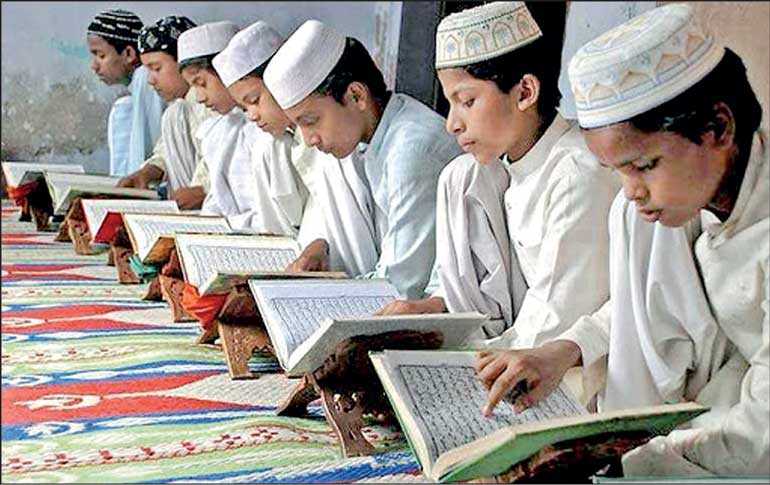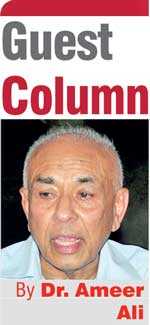Wednesday Feb 25, 2026
Wednesday Feb 25, 2026
Saturday, 28 November 2020 00:07 - - {{hitsCtrl.values.hits}}

President GR’s resolve to bring about a disciplined and virtuous society can be built though madrasas if he intends to include the Muslim community also in his vision. Instead of that, just monitoring to catch foreign teachers, which could be done at the airport, is no solution to madrasa problems
 Killer Zahran, a backyard autodidact Islamist extremist, who was not a product of any reputed madrasa as maliciously propagated by ill-informed politicians and anti-Muslim phobists, but a reject from more than one madrasa, has by accident may have become a catalyst for reformation in Muslim religious education.
Killer Zahran, a backyard autodidact Islamist extremist, who was not a product of any reputed madrasa as maliciously propagated by ill-informed politicians and anti-Muslim phobists, but a reject from more than one madrasa, has by accident may have become a catalyst for reformation in Muslim religious education.
Long before the Easter Sunday massacre of 2019, several Muslim intellectuals and educationists from different parts of the world had been calling for modernising madrasa education and its curricula, with a view to turn that institution into a useful partner in the battle for knowledge production and distribution, which is increasingly becoming scientific and technology oriented founded on critical thinking.
Historically also, it was the type of critical knowledge produced by medieval madrasas that set ablaze the European Dark Age and triggered the birth of European Enlightenment and European modernity – a fact today’s European supremacists are trying hard to obliterate from human memory.
Be that as it may, the anti-Muslim phobia that burst out into the open after 2009 and in the wake of the war victory received an unexpected boost from the Easter Sunday mayhem, and since then madrasas have become a thorn on the side of the phobists.
When they violently agitated for the closure of all madrasas in the country, the Yahapalana Government of that time panicked, decided to register all madrasas and deported all foreign teachers employed in those institutions. This was an action taken in haste and more to calm down the agitators than out of any studied understanding about the role of madrasas in Muslim societies. There is no denying the fact however, that by the turn of the century a few affluent madrasas, because of financial aid from wealthy Muslim nations, had become hotbeds of Wahhabi teachings and ultra-religious conservatism, a development not confined to Sri Lanka alone. In fact, Wahhabi indoctrination was part of an American imperialist strategy intended to subdue the Iranian inspired Islamic awakening, which threatened to topple the West built Middle East Order.
But madrasas were not the only conduit for the infiltration of Wahhabism in Sri Lanka. Several Muslim men and women who went to Arab countries for employment came back as Wahhabi agents of change. This author in a number of publications had traced the history of Islamic orthodoxy and conservatism in Sri Lanka, and had been unreservedly critical of local Muslim leadership that failed to take cognisance of that development and take measures to stem its alienating impact.
Zahran was certainly a Wahhabi agent of change and an embodiment of ultra-conservatism and extreme Islamism, but he did not become so through madrasa education but from outside of it. Those who link him with madrasas are deliberately indulging in malicious propaganda.
Likewise, a few days ago, the Minister of Education, a legalist and not an educationist, made a statement that he was monitoring the madrasas. What was he monitoring? Does he have any clue about what consists of traditional madrasa teaching? Has he ever stepped into a madrasa and observed the teaching and mode of education imparted by the teachers or discussed with the authorities on issues confronting madrasas?
Following the Minister, another of his Cabinet colleagues, who in his student days was expelled from school for not attending GCE A/L classes, was also mongering fear about madrasas. They seem to be totally clueless about what they were talking about. As always, fear springs from ignorance, and there is a grand ignorance about madrasa education and its role in Muslim society along the nation’s corridors of power.
Yet, there is no running away from the need to reform madrasa education. Its history in this country is more than a century old. To start with, it was the madrasas that kept the flame of Islam burning in the nook and crannies of this blessed island, and more importantly, like Buddhist pirivenas, they too performed yeoman service to tens of thousands of poor families, who otherwise would have found it difficult to keep their children away from social evils and crime. In an era when modernity has made juvenile delinquency a chronic evil, spiritual values and self-discipline inculcated by teachers in institutions like pirivenas and madrasas are a welcoming solution that need encouragement and not discouragement. But the problem with these institutions is that they have not kept pace with developments with modernity.
Unfortunately, because of their chartable character and dependence on voluntary contributions majority of madrasas in Sri Lanka do not have the wherewithal to improve their facilities and modernise their curriculum and pedagogy. This is their crying need now, and if the Government is serious in providing an all-round education for all children at low cost, madrasas could be turned into a useful partner in that venture.
President GR’s resolve to bring about a disciplined and virtuous society can be built though madrasas if he intends to include the Muslim community also in his vision. Instead of that, just monitoring to catch foreign teachers, which could be done at the airport, is no solution to madrasa problems.
Sadly, because of their opportunistic and muddle-headed political leadership, Muslims of Sri Lanka have become an entrapped community in a supremacist autocracy. They are at the receiving end of an unyielding regime that is governed by a group of ideologues who have no room for tolerance for Muslim religious and cultural sentiments. There is no better example of this intolerance than the current intransigence about cremating corona-killed Muslims. Contrary to all scientific evidence the decision to cremate Muslim dead bodies was taken purely on the basis of a health official’s opinion that the virus would spread because of high water level below the ground, a flimsy argument to say the least.
What is crucial here is not that argument, but a warning issued by Ven. Methagoda Abayatissa Thero, one of the prime movers behind GR’s presidential victory as well as that of SLPP at the General Election, who said that, allowing Muslim bodies to be buried in defiance of the so-called expert advice to cremate tantamount to burying the Government itself. Here lies the politics behind that issue.
The same intolerance was also expressed by Gunadasa Amarasekera, one of the architects of jatika chintanaya and joined by a street larrikin, Ven. Gnanasara. Between the pseudo-scientists and supremacists Muslims are trapped and are paralysed in spite of a Muslim Minister of Justice in the cabinet. The same intolerance and mulishness is exhibited in relation to madrasas also.
In conclusion, let there be some rationality, objectivity and flexibility when dealing with a community’s cultural issues. Madrasas should not be viewed as a medieval anachronism and training centres of Islamist extremism that need to be put under surveillance, as seems to be the prevailing official attitude.
If the Easter massacre was the reason for this attitude it is a total mistake, because that condemnable infamy had nothing to do with madrasas. Instead, with appropriate reforms they could be turned into a vital organ of a modern society, encouraged to fill in with a type of knowledge and training that is mostly absent in modern education. It will be advisable if the Minister of Education takes the initiative to call Muslim intellectuals and Muslim educationists in the country to submit suitable recommendations to modernise this historic institution.
It is true that the country is facing insurmountable financial difficulties in the midst of an unprecedented economic recession. There are too many demands competing for government funding. Therefore, modernisation of madrasas will obviously entail additional financial burden. However, it was President GR who said that guts bring glory. If he has the guts to take a positive step towards madrasa education, despite opposition from his idealogues and advisors, the Muslim world will come to his aid. Will the Muslim minister and Muslim parliamentarians push for this change rather than remaining silent? Nothing ventured nothing gained.
(The writer is attached to the School of Business and Governance, Murdoch University, Western Australia.)